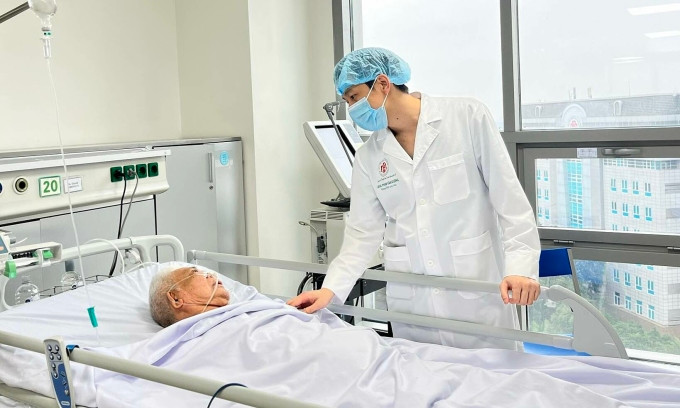After waking up, people should lie in bed for about 5 minutes, breathe, and move gently before getting off the bed, according to the doctor.

A stroke patient is treated at Hospital 108.
The cold weather and changes in living habits near Tet have caused many people to suffer from myocardial infarction and cerebral infarction and have to be hospitalized. During the last days of the year, doctors from the Cardiovascular Intervention and Stroke Department, Hospital 108, continuously treated and saved the lives of many patients with myocardial infarction and cerebral infarction.
Dr. Pham Van Cuong, Stroke Department, 108 Military Central Hospital, said that cold weather can cause blood vessels to constrict, increasing pressure on blood vessels and leading to high blood pressure, which leads to cerebral hemorrhage - a common cause of stroke. In addition, when it is cold, the body produces more red blood cells and platelets, causing blood to clump and form blood clots, leading to stroke due to blockage of blood vessels in the brain.
In Vietnam, stroke patients increase from 15% to 20% in winter. As in the North, cerebral infarction cases are common in November, December, and January. During these 3 months, the number of stroke patients, including cerebral infarction and cerebral hemorrhage, depending on the locality, accounts for 30-50% of the total number of stroke patients of the year.
According to nurse Nguyen Thi Huyen Trang, International Department, Hospital 108, getting out of the blanket/bed/bedroom are all times when the environmental temperature changes, so it is important to change slowly to avoid too much and sudden temperature difference.
In addition, when waking up, the body is still in a resting state, not yet adapted to activities, the circulatory system operates at low capacity, if waking up too quickly will lead to the risk of high blood pressure. Everyone needs to pay attention to perform some actions immediately after waking up to ensure safety.
Specifically, after waking up, people lie in bed for about 5 minutes, breathe, and move gently such as stretching their arms and legs to gradually increase blood circulation so that the body can adapt safely. Then, slowly stand up, get out of bed, and move both arms rhythmically for a few minutes to warm up the body with higher intensity. Waking up slowly also helps limit falls in the elderly.
When opening the door, you should stand aside to avoid the cold wind blowing on you suddenly. After opening the door, you should stand near the door to warm up for a few minutes with light movements and then gradually move outside. The elderly should maintain this habit in the morning to have stable health and avoid unfortunate risks.
How to recognize signs of stroke through FAST:
FACE: Face feels numb, one side of the face is crooked when smiling, crooked smile, vision disturbance.
ARM: Numbness and fatigue in arms and legs or inability to lift one arm or leg.
SPEECH: Speech is slurred, unclear, unable to express.
TIME: Call an ambulance to a medical facility that can provide emergency care and treat strokes as soon as possible.
When you see someone with at least one of the three symptoms above (facial droop, weakness in limbs, difficulty speaking), think of a stroke and call an ambulance immediately, without delay. The golden time frame for the best treatment results is the first 6 hours from the time of the stroke.
HA (according to VnE)